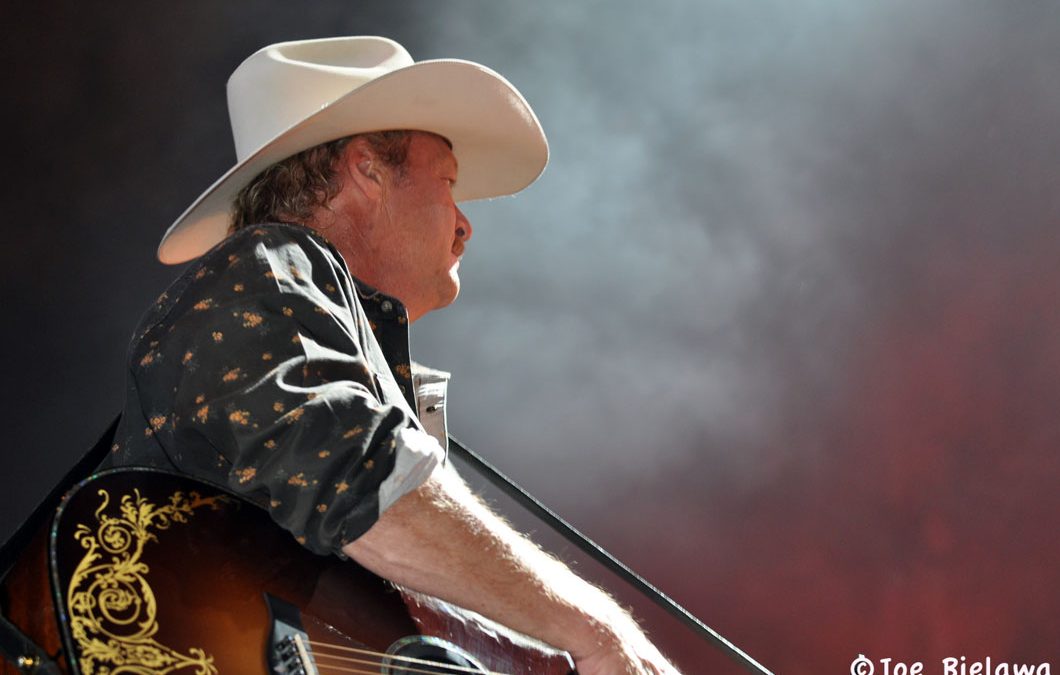Alan Jackson’s Wife Details Her Journey of Faith and a Life With a Country Superstar
Originally published by cmt.com staff 7/27/2007
 Editor’s note: In her new memoir, It’s All About Him: Finding the Love of My Life, Denise Jackson emphasizes the importance of her faith as she recounts the highs and lows of her marriage to country superstar Alan Jackson, whom she wed at age 19. More than 200 of the couple’s friends gathered Thursday (July 26) at the Schermerhorn Symphony Center in Nashville to celebrate the release of the book which goes on sale Tuesday (July 31). In this chapter, “Daunting Disappointments,” Denise details their frustrating early years of living in Nashville.
Editor’s note: In her new memoir, It’s All About Him: Finding the Love of My Life, Denise Jackson emphasizes the importance of her faith as she recounts the highs and lows of her marriage to country superstar Alan Jackson, whom she wed at age 19. More than 200 of the couple’s friends gathered Thursday (July 26) at the Schermerhorn Symphony Center in Nashville to celebrate the release of the book which goes on sale Tuesday (July 31). In this chapter, “Daunting Disappointments,” Denise details their frustrating early years of living in Nashville.
There’s usually a big difference between what you imagine will happen when you go off to pursue your grand dreams and what actually takes place. Alan and I both knew that Nashville wouldn’t exactly welcome us with open arms and a key to the city, but still, our early days there were pretty depressing.
We stayed in that dank little apartment for two months, which was exactly two months too long. Drug deals were going down in the hallways; strange men came and went at all hours of the night. I wasn’t comfortable going to the laundry room if Alan wasn’t home. There was a fire in one of the apartments, and then a domestic shooting in another.
After that, I was by the front door when Alan got home:
“I love you to pieces, honey,” I told him, “but I am not staying here.”
Thankfully, God had prepared a place for us. A little notice had just gone up on the bulletin board in the employee workroom at the Nashville Network [where he was employed], of a cozy basement apartment in a quiet, nice neighborhood, for $350 a month. We jumped at it. On our moving day, when we stopped at a 7-Eleven store on our way to the new place, a man saw our truck loaded with our old, battered furniture.
“Hey!” he shouted. “You just come from a yard sale?”
We hauled our hand-me-down furniture into the little apartment. It had brown shag carpeting that blended just fine with our old brown and orange patchwork sofa. In our bedroom, our mattress had belonged to Alan’s older sister. We could see why she’d decided to give it away: it had a trench worn into the middle, and Alan’s feet hung off the end. But at that time we were glad to get anything.
Alan, who is 6-foot-4, had to sleep on it diagonally. Since he was heavy, I spent half the night trying to claw my way out of the “Alan trench,” and the other half curled into a little triangle of space.
Busy Airports and a Lumpy Mattress
In order to have a regular flight schedule and not be on call, I had to be based in Washington D.C., which meant that I had to start and end my trips there. While other flight attendants bid for layovers in the most exciting cities, I just tried to get schedules that allowed me to spend as much time in Nashville with Alan as possible.
So I was getting up very early in the morning, flying to Charlotte, N.C., to make a connection, then to D.C., just to begin my scheduled flights. On the way home I’d run through airports to catch the late flight home to Nashville, Alan, and that lumpy mattress.
Alan would pick me up at the airport. Since this was before the tightening of airport security, he could just idle at the curb outside Piedmont arrivals, waiting for me to emerge. Our only vehicle at the time — a Dodge Transvan — happened to look a lot like the shuttle vans that transported travelers to and from their parked cars. One night Alan was waiting for me at our usual curb when a businessman opened the van’s door and hopped into the front seat.
“To parking lot G, please!” he commanded.
Alan sat at the steering wheel, pondering whether he should take this guy for a little ride around the airport or let him go. In the end he informed the businessman that he needed to catch the airport shuttle, that Alan in fact was a private citizen waiting to pick up his wife. The man reluctantly got out. For our part at least we knew that if Alan’s music career never took off, he could always get a job at the airport, driving a shuttle bus.
I loved flying. I enjoyed making passengers feel welcome and comfortable; I liked taking care of their needs. I loved getting to know the other crew members; there was a fun camaraderie between the flight attendants and the pilots. Though some of them partied together, I wasn’t interested in getting together with anyone. I just enjoyed the meals out as a group, the laughter, sightseeing in places I’d never been (which weren’t difficult to find, since I’d hardly been anywhere), and shopping (even though I browsed a lot more than I bought, since we didn’t have much money).
Paying His Dues
In the flying world I felt competent and connected with others … but then I’d come home to Nashville and feel a bit disconnected from what Alan was experiencing in the music world. Much of it was pretty depressing anyway. One time I flew up to Canada to meet him at a gig somewhere. Alan’s band was playing at a bar that was connected to a hotel. The floor was sticky with old beer and who knows what else. The patrons were drunk and rude, and most of them could not have cared less about Alan, the band, or music in general. They just kept downing drinks and coming and going from the strip joint that was next door to the bar.
In the music business, playing in these kinds of places to crowds that don’t listen is called “paying your dues,” and if anybody paid his dues, Alan did. He’d drive to a gig maybe six, 10, 14 hours away, with the heavy music equipment loaded into a trailer he pulled behind the Dodge Transvan, which we jokingly called the “Country and Western Showbus.” (Saying “country and western” is like saying “stewardess” instead of “flight attendant.”)
Alan would unload all his stuff, do a sound check, play from 8 p.m. to 1 or 2 in the morning, inhaling dense clouds of smoke, then crash in a cheap hotel, get up the next morning, head for the next destination, and do it all over again. Even worse than that was having to play at the same dreary place for more than one night — at least going to a new place gave Alan some slight hope that conditions might be better at the next stop.
By the time he paid his band and the expenses, there wasn’t much — if anything — left. Sometimes he even lost money. But even back then, he knew that murky gigs on the road would give him the experience that he needed for the bright future he was determined to reach. Meanwhile, he was writing songs for Glen Campbell’s production company — for the grand sum of $100 a week.
The lonely nights of dark bars, stale pretzels, and sticky floors were so different from my earliest musical memories. I remember my mother’s family reunions when I was a little girl. As I said earlier, Mother was one of 13 siblings. All the Browns, large and small, would gather at an old Methodist church in the country, where earlier generations of Browns were tucked under warm, gray stones in the old cemetery.
Everyone brought picnic baskets full of crispy fried chicken and creamy deviled eggs. There were vegetables fresh from the garden, a rosy ham, sweet cornbread, baked beans, a snowy coconut cake, and crunchy pecan pies.
After we were full from the feast, we’d all gather around the old piano in the church fellowship hall. One of my aunts would play, and everyone would sing, with wonderful harmony, the great old hymns that were part of the ties that bound us together.
That rich fellowship was a far cry from Alan’s drab life on the road and my hectic commutes from airport to airport. But nothing in our experience is wasted, and I know that God used that time in our lives in a variety of ways … ways I couldn’t appreciate until many years had gone by, when I could see God’s purposes in the rearview mirror.
At the time it was just plain hard. I remember paying our bills only to discover that there was nothing left, except two more weeks before the next paycheck would come. Each time I cried, Alan tried to cheer me up. He kept saying that it wouldn’t be this way forever. But that didn’t magically change our finances.
Sometimes we’d wonder what in the world we were doing … why we were putting ourselves in such dismal situations when we had families and friends who loved us and would have welcomed us back home with open arms. We often thought about all the warm fellowship and wonderful Sunday dinners we were missing at Alan’s mother’s house. Maybe all the stress and cold rejection just wasn’t worth it.
But Alan never gave up. All the disappointments and challenges that we faced just made him more determined to reach his goal.
Hoping for the Best
We had given ourselves five years to make it in Nashville. If things didn’t work out, then we really would go back home. Life there would be different from our big dreams, but it would still be good.
Thankfully, [music publisher Marty Gamblin] introduced Alan to many people in the music business, like Gary Overton, Keith Stegall, and Barry Coburn. Like Marty, these guys played instrumental roles in Alan’s career. I couldn’t even begin to name all the wonderful people who did so much to help and promote Alan in those early days. We are forever in their debt.
For more than three years Marty did everything he could to spark record label interest in Alan. Time after time he solicited producers to record demo tapes that he would then pitch to executives … in fact, every record label in town rejected Alan at least once. Some turned him down twice. One executive listened to Alan’s demo and sighed. Then she told Alan that he just didn’t have star quality and that he should go back to Georgia and get a job doing something else. Later, one label decision-maker actually agreed — verbally — to sign Alan. Marty, his wife Cherie, and Alan and I were so thrilled that we went out to a nice restaurant to celebrate. But the deal never materialized … and it was all so discouraging, to say the least.
Eventually Glen Campbell’s music company financed a demo session that allowed Keith Stegall to produce a new tape of Alan singing a few songs that he had co-written. Marty pitched it to his friend Shelby Kennedy, who in turn shared it with his friend, Anthony Von Dollen. Anthony listened to the demo and then convinced Tim Dubois, head of Arista Records in Nashville, to hear Alan perform live in a showcase performance sponsored by Glen Campbell Publishing and Barry Coburn. (Barry would later become Alan’s sole manager.) Tim was a songwriter himself, so perhaps he recognized Alan’s depth and artistic creativity. He took a risk and signed Alan as the very first recording artist for Arista’s new country division.
By this time more than four years had gone by in our five-year Nashville plan. We weren’t kids any longer. I was 29 and we both felt that perhaps with this new record deal signed, we could start a family.
To our surprise, I became pregnant right away. We were absolutely thrilled but weren’t sure exactly what in the world we were getting ourselves into. Deciding to try to become pregnant was not nearly as scary as being pregnant. At the time, a flight attendant in my airline could work through her seventh month of pregnancy, and then had to take an unpaid leave of absence. We couldn’t help but wonder what we would do about little things like insurance and money to buy groceries and diapers.
Half the time I was exuberant and happy. I felt great, and the pregnancy progressed wonderfully, even though I eventually had a little trouble in my maternity uniform, making my way up those narrow airplane aisles.
But the other half of the time I was gripped by a cold fear. What would we do if Alan’s record failed?
We waited, hoping, even praying a little, though we had not even thought much about God or been to church since we’d moved to Nashville. There just wasn’t time for it anymore, it seemed, and so, without realizing it, we were drifting from the moorings that had helped to secure us when we were young. Bit by bit, we were usually going with the flow all around us.
For example, Alan’s new manager thought it would be wise to change Alan’s name, considering that another country artist had a similar name. We considered John Alan … John Hubert (both versions of Alan’s grandfather’s name), but in the end, we all agreed that he would keep the name he was born with. Thank goodness for that.
Names were one thing, but it was less amusing when they messed with his image. They didn’t want it to seem like he was married. This isn’t unusual; I’ve heard stories of performers’ wives who were told by management to stay home, keep a low profile, pretend you don’t exist. The presence of a wife might affect the new star’s image as the latest new country sex symbol.
In our case, though, it didn’t look like anything was going to happen to make Alan into a hot star anytime soon.
The Real World?
The first album was called Here in the Real World. Its first single was “Blue Blooded Woman,” the song of a redneck man and his higher-class love.
Around this time Alan started going on radio tours, meeting disc jockeys and program directors, promoting himself and his new album. At this point image was everything. The idea was to look like a big star even if you weren’t. We wanted people to see Alan arriving at the radio stations in a long, black limousine. Even if they had never heard of him, they’d think he was someone important when they saw him climb out of his stretch limo wearing his signature torn Wrangler jeans, his Stetson hat, and his custom-made cowboy boots.
The problem was, the radio stations just weren’t going to fork out the bucks for a limo for an unknown like Alan Jackson. One station told Alan and his manager that they’d send transportation to pick them up at the airport … and it was a 1970 station wagon with wood panel sides. A station in another state sent an old VW hippie camper with flower decals on the sides and laminated kitchen cabinets inside.
Finally a radio station in West Virginia actually sent a limousine to pick up Alan at the airport. The only problem was it was ancient, with enormous mud-grip truck tires, and the entire rear end had been crumpled by a collision. The driver put Alan’s luggage in the smashed trunk, but the lid wouldn’t close. So he tied it down with a piece of twine and took Alan off to the station, traveling in style.
When “Blue Blooded Woman” was first released, Alan and I bribed our friends Gary and Jan Overton to come over to our basement apartment. We promised them that we would order pizza if they would help us call various country radio stations across the nation to request Alan’s new single. Gary was originally from New Jersey, so he called the Northern ones, requesting that they play “that great song from that new singer, what’s his name, uh, Alan Jackson?”
Meanwhile Alan and I called the Southern stations. “Hi,” I’d drawl. “I’m just calling to see if you could play that really great new song, you know, ’Blue Blooded Woman’?”
“What?” they’d say to me. “Blue Bloody Woman?? What’s that? Who’s it by?”
“Alan Jackson!” I’d say proudly.
“Never heard of him!” they’d yell.
Well, we didn’t exactly send Alan’s single rocketing up the charts. Neither did anybody else. We watched the country music charts obsessively. “Blue Blooded Woman” made its way up to number 43 … and then it absolutely died. Most radio stations in the country never even played it.
From It’s All About Him: Finding the Love of My Life
Published by Thomas Nelson and available on Amazon. © 2007

